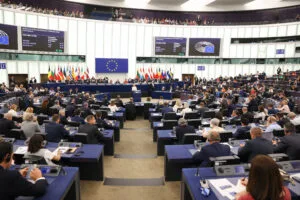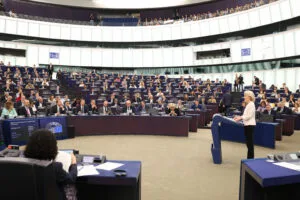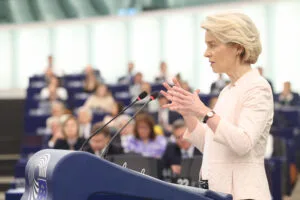From the Envoy in Strasbourg – A keynote speech lasting almost an hour by Ursula von der Leyen at the plenary session of the EU Parliament to seek a confirmation vote for a new term at the European Commission shows a clear indication of choice of seeking support from the Greens, but also an equally clear balancing act with the right wing of her European People’s Party, to avert that votes slip out in the secrecy of the ballot box. Her election in a few hours is not a certainty. However, it should comfortably exceed the 361 minimum threshold with the compact support from the 53 MEPs in the Greens/ALE group and without significant hemorrhaging in the larger one (188), even without the 24 members of Fratelli d’Italia.

“What we do now will shape our work for five years and define our place in the world for the next 50,” the outgoing European Commission President, who was nominated by the European Council for another five-year term on June 27, said at the beginning of her speech before the 720 MEPs in the Strasbourg hemicycle this morning (July 18). “Just like you, I came into politics to make a difference for all of society to deliver for the generation of my children and grandchildren” because “the version of Europe since the end of World War II, with all of its imperfections and inequalities, is still the best version in history. I will never stand by and watch it be torn apart from the inside or the outside,” von der Leyen pledged. Hence the “vision I have set out in my political guidelines” for a second term at the head of the EU Commission: “ A stronger Europe that delivers social fairness and supports people. And that sticks to the targets of the European Green Deal with pragmatism, technology-neutrality, and innovation.”
It is precisely here that von der Leyen shows her choice, as she does not back down on one of the top priorities of her five-year term in its final throes – the European Green Deal – and does not open up to the upheavals demanded by Giorgia Meloni’s right-wing European Conservatives and Reformists (ECR). “We will stay the course on our new growth strategy and the goals we set for 2030 and 2050. Our focus now will be on implementation and investment to make it happen on the ground,” the outgoing Commission head and nominee said, relaunching with the promise of a “new Clean Industrial Deal. It will channel investment in infrastructure and industry, in particular for energy-intensive sectors.” Green policy and industrial policy will be tied together over the next five years – if von der Leyen is confirmed – with the pivot to the 90 percent greenhouse gas reduction target in the climate law, which will serve industries that “need to plan their investments for the coming decade already today.” But pushing on the Green Pact “isn’t just about competitiveness, it’s about intergenerational justice,” because “for our young people, 2030, 2040, 2050 is around the corner” and “they would never forgive us if we do not rise to the challenge.”

In her keynote address to the EU Parliament, von der Leyen pushed not only on reassurances to industry but also on reassurances for farmers (to make the opening to the Greens digestible by the more restless Populars). “It’s important to remember that agriculture is a sensitive topic “We need to overcome disagreements and find solutions,” particularly through “a strategy for the agriculture and the food sector” that builds on the outcome of the strategic dialogue of recent months: “I will work to ensure that farmers have a decent and fair income. No one will be forced to sell agricultural products below cost.” Again, however, for a blow to the rim of the more right-wing Populars, there is a blow to the barrel of the Greens: “I foresee a plan for agriculture with necessary adjustments to climate change and a strategy to manage water resources.” Without forgetting that “those who want to contain climate change and protect the environment must take into account the conditions of farmers because they provide food security.”
There is also ample room for growth and investment, focusing on small and medium-sized enterprises and echoing the lines drawn by Enrico Letta in his report on the future of the Single Market. “We must complete the Capital Market Union. We will propose a savings and investment union and a new European competitiveness fund,” von der Leyen said, as “Europe must once again become the home of opportunity,” not only on the investment front but also on the social front. The biggest challenge is the housing crisis – “prices continue to rise, and houses are becoming more and more unaffordable” – which will be addressed by the appointment of “a Commissioner with direct responsibility for housing” and the development of “a European Affordable Housing Plan with public and private investment.” Also on the social focus, von der Leyen also devoted a passage of her speech to the need to kick off the “first European survey on the impact of social media on young people” to combat cyberbullying and the fight for gender equality: “Stop the rise in violence against women. Reconcile care and career, not only for women, but women are mostly affected. Close the pay and pensions gap. It is no coincidence that poverty in old age has a female face.”

On foreign policy, the President of the Commission candidate for a second term confirmed that EU enlargement remains “an enormous geostrategic responsibility for Europe” and that “We will support candidates by working on investment and reforms and integrating them where we can into our legal frameworks” because the countries of the Western Balkans, Ukraine, Moldova, and Georgia “have chosen freedom in the face of oppression and some are paying a high price.” On the Israel-Hamas conflict, she said: “I want to be clear: the bloodshed in Gaza must stop now. Too many children, women, and civilians have lost their lives as a result of Israel’s response to Hamas’ brutal terror. We need an immediate and enduring ceasefire. We need the release of Israeli hostages.” However, the major focus remains on Russia’s war in Ukraine, with a direct attack on the Hungarian prime minister, Viktor Orbán: “Russia is banking on Europe and the West going soft. And some, in Europe, are playing along. Two weeks ago, an EU Prime Minister went to Moscow. This so-called peace mission was nothing but an appeasement mission.” On the contrary, “we must give Ukraine everything it needs to resist and win” and, at the same time, “we must protect Europe. It is time to build a European Defense Union,” through “a single defense market” and “common projects, such as a European air defense shield,” is von der Leyen’s indication.
The last point — confirming a sharp change of narrative on the migration and asylum front — is about doing more “to secure our external borders” and “strengthening Frontex” and proposing “to triple the number of European border and coastguards to 30,000.” (In addition proposing to “to double Europol’s staff. I want Europol to become a truly operational police agency.”). Von der Leyen speaks of “managing migration efficiently and equitably” and of migrant people who “are human beings like you and me. All of us are protected by human rights,” but then immediately veers to a “common approach on returns” and the “development of partnerships on the southern front,” a topic that allows her to propose the appointment of “a Commissioner for the Mediterranean region and a new Agenda for the Mediterranean together with Kaja Kallas,” the High Representative designated by the European Council “Because the future of the two Mediterranean shores is one and the same.” Last passages on continuing the hard line on respect for the rule of law (“it will remain a must for access to EU funds, present and future”) and on “necessary changes to the Treaties,” for which she promises to “follow up on the right of legislative initiative” of the EU Parliament. Before the conclusion that involves not only Jacques Delors, one of the founding fathers of the European Union but also the former president of the European Parliament who passed away on January 11, 2022, David Sassoli: “We, the people of Europe, are our best hope in a dangerous world, Sassoli said, and today the hope of Europe is in your hands. You who are the democratic forces.” The vote of the 720 MEPs this afternoon will be a response to this appeal by von der Leyen.
English version by the Translation Service of Withub









